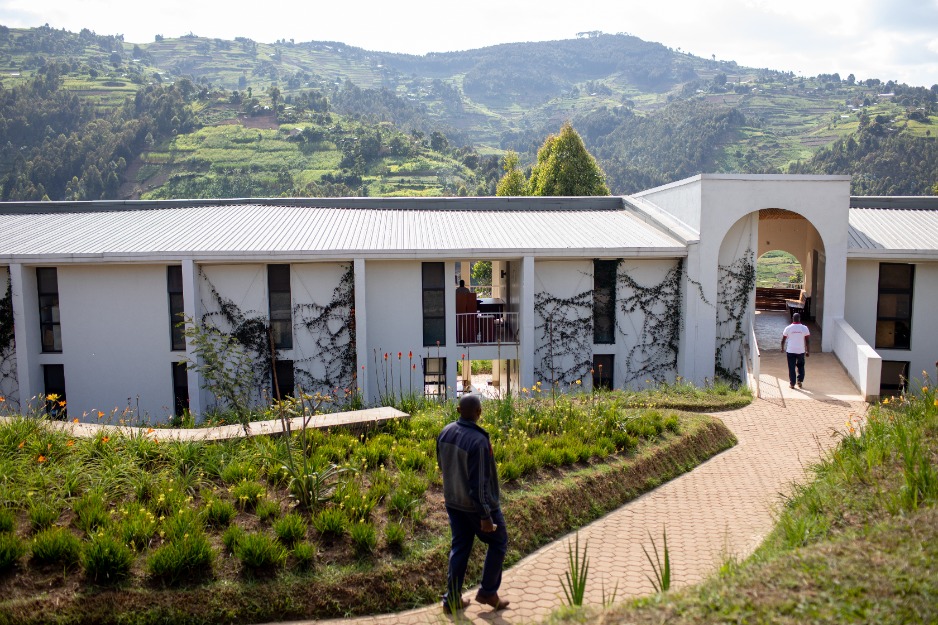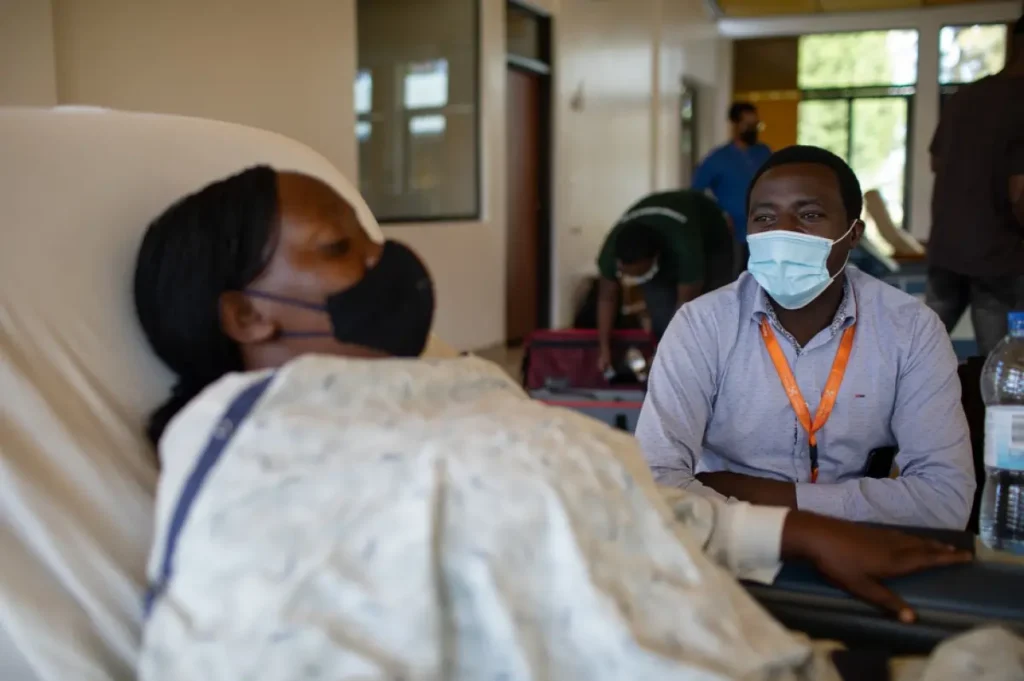Research: In Rwanda, Cancer Care Continued Amid COVID-19

New research highlights innovation, and partnership to ensure chronic care
Posted on May 9, 2022

Just days after the first COVID-19 case was detected in Rwanda, the government suspended all international commercial flights and instituted a national lockdown.
At Inshuti Mu Buzima, as Partners In Health is known locally, staff were worried.
“We thought, ‘Our patients are going to die because they can’t reach our center,’” recalls Dr. Cyprien Shyirambere, Burera District program director with Inshuti Mu Buzima. “We had to come up with innovations.”
Those innovations would involve cars, trucks, and drones.
In 2020, even as the pandemic surged, lifesaving cancer drugs were delivered to patients in Rwanda and beyond, thanks to the efforts of Inshuti Mu Buzima, the Rwandan Ministry of Health, and key partners.
That continuity of care is the focus of research co-authored by PIH staff, published in the April 2021 edition of the Journal of Global Health, titled “Cancer care delivery innovations, experiences and challenges during the COVID-19 pandemic: The Rwanda experience.”
The paper comes as the latest evidence of the importance of building deep partnerships with local governments and others to ensure that patients continue to receive chronic care in times of crisis.
A Growing Need
Inshuti Mu Buzima has worked in Rwanda since 2005, strengthening the health system in collaboration with the Ministry of Health. Butaro District Hospital was one of the early fruits of that partnership, with doors opened in January 2011.
The Butaro Cancer Center of Excellence soon followed, launched in 2012 and located next to the hospital. Its services include diagnostics, chemotherapy, surgery, and palliative care. Breast cancer and cervical cancer are among the types of cancers most often treated at the center, as well as pediatric cancers such as nephroblastoma.
Nearby, a 68-bed cancer support center offers free housing where patients can stay short- or long-term while they receive treatment, removing the financial burdens of lodging and transportation for patients who may have to travel as far as six hours to reach Butaro.
The center has quickly become a regional hub for cancer care—and it’s responding to a growing need.

Cancer is the second leading cause of death worldwide, eclipsed only by heart disease. But not all patients have equal access to care. Of the 9.6 million people who died of cancer in 2018, more than 70% of those deaths occurred in low- and middle-income countries, according to the research.
While Rwanda has made huge progress over the past 20 years on health indicators such as maternal mortality and infectious disease control, non-communicable diseases such as cancer have seen only modest gains. Cancer cases in Rwanda increased by 60% between 2012 and 2018.
At the cancer center, the beds have been filling up. In its first year, the center saw 561 patients. By 2015, that number had jumped to 4,500. To date, the center has enrolled nearly 13,000 patients.
When the first COVID-19 case was discovered in Rwanda in March 2020, Shyirambere and his colleagues feared that work would grind to a halt.
‘Our Patients Are Going to Die’
With a curfew of 7 p.m. and movement restricted between districts, the cancer center temporarily paused its services. But its doors stayed open.
Inshuti Mu Buzima staff called an emergency meeting. The longer they waited, they feared, the more cancer patients would be at risk of worsening symptoms or even death.
In the days that followed, a strategy quickly took shape. The team asked the Ministry of Health for permission to circumvent the lockdown and readied its fleet of cars and trucks.
“We had to improvise,” recalls Shyirambere, who was Inshuti Mu Buzima’s director of oncology at the time. “It was really amazing to see.”
For patients who needed their treatment but didn’t need to see a doctor, the team delivered the drugs by car to local health centers, where patients could pick them up just minutes away from their homes.
There was another tool at the ready: drones.
To reach those in remote areas, the team partnered with Zipline, a drone company, to identify patient locations, design flight routes, and drop off the drugs at the nearest health center.
These innovative strategies allowed patients to continue their treatments while staying close to home, reducing their risk of exposure to the virus.
For patients who needed in-person care, Inshuti Mu Buzima dispatched cars to pick them up and bring them to the cancer center in Butaro, where they could stay overnight, if need be, in a home with free meals and health staff on call.
The center treated 935 patients, conducting over 1,982 visits, from March to June 2020. More than half of these patients received IV chemotherapy.
That care extended beyond Rwanda’s borders, including 93 patients from the Democratic Republic of the Congo and Burundi.
Congolese patients were picked up at the border and, after they cleared immigration, driven directly to the center, where they were given a space to quarantine with free meals. Burundian patients, who couldn’t cross the border, received their drugs in the mail, with assistance from the Burundi Cancer Patient’s Association.
Finally, Inshuti Mu Buzima provided social support to 568 patients among the most vulnerable. This support included essential resources like hand sanitizer, face masks, and direct cash transfers—helping patients living in extreme poverty access lifesaving care and prevent COVID-19 infection.
For Shyirambere, who has been treating cancer patients for eight years, the team’s cancer care strategy amid COVID-19 was a lesson in three things: innovation, flexibility, and partnership.
“There is always something you can do, if you think outside the box,” he says. “Seeing patients who were desperate, who were waiting at home to die…come and get the treatments…that was really amazing.”
Originally published on pih.org



